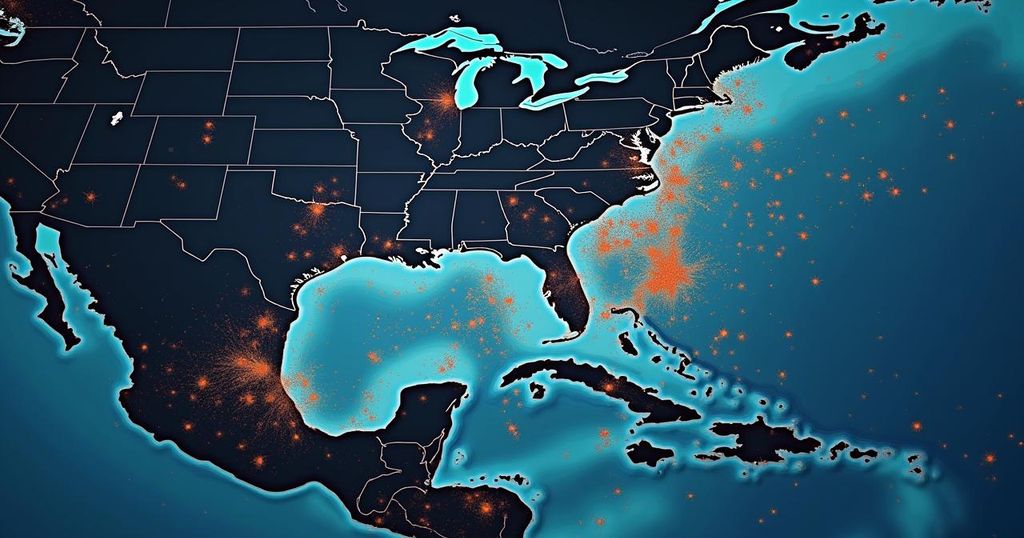The Ripple Effect: How Gulf Hurricanes Influence Storms in Virginia and North Carolina
Hurricane Helene severely affected the Southeastern United States, causing road closures, power outages, and flash flooding, particularly in Virginia and North Carolina. Dr. Majid Shafiee-Jood, from the University of Virginia, explains the dynamics of hurricanes producing these storms further north, while also creating a database to analyze public responses to evacuation orders during such events.
The Southeastern United States is currently grappling with the aftermath of Hurricane Helene, which resulted in widespread road closures, power outages, and devastating flooding, particularly in mountain regions of states such as Georgia, the Carolinas, and Virginia. Dr. Majid Shafiee-Jood, a research assistant professor in civil and environmental engineering at the University of Virginia, elucidates the mechanisms through which hurricanes provoke storm activity in these northern areas. At the core of the phenomenon are the rapidly rotating storm systems that characterize hurricanes, which produce abundant moisture and consequent heavy rainfall. Depending on both the dimensions and pace of the hurricane, the resultant precipitation may lead to flash floods, defined as sudden flooding events that materialize shortly after intense rainfall, often within six hours and typically within three. The scenario is distinctly different from coastal flooding caused by storm surges. Flash floods may arise from significant rainfall in concentrated regions, exacerbated in urbanized landscapes due to limited ground absorption, or in mountainous terrains where saturated soils and steep inclines facilitate rapid runoff. Such conditions are currently being encountered in western North Carolina and parts of Virginia. Dr. Shafiee-Jood clarified that while the occurrence of spinoff storms from southern hurricanes is not uncommon, it is a phenomenon observed in prior hurricanes as well. For instance, during Hurricane Michael in 2018, southeastern states experienced similar repercussions from a landfall originating in the Florida panhandle, with recorded rainfall causing nearly critical levels at local dams, such as the Banister Dam in Halifax County. In the realm of storm preparedness and public safety, Dr. Shafiee-Jood co-developed a pioneering hurricane evacuation order database with colleagues Negin Alemazkoor and Harsh Anand. This database aims to systematically analyze decision-making processes surrounding hazardous weather information. Utilizing data from recent incidents, such as the evacuation orders issued in Florida ahead of Hurricane Helene, this research seeks to quantify the public’s responses and assess the effectiveness of such evacuation protocols. The ultimate goal is to enhance understanding of how individuals and officials react to emergency communications, particularly in high-stakes situations, thereby improving future emergency management outcomes.
Hurricanes can produce severe weather impacts far beyond their immediate landfall areas. As these tropical systems move northward, they unleash substantial rainfall, leading to flash flooding—a significant and rapid rise in water levels that poses severe risks to communities. Understanding the dynamics of how hurricanes in the Gulf States affect weather patterns in the Southeastern United States, including states like Virginia and North Carolina, is essential for preparing for and mitigating the adverse effects of such weather events. Dr. Majid Shafiee-Jood’s research emphasizes the importance of effective decision-making based on hurricane forecasts and evacuation orders, aiming to improve public safety during hurricanes.
In summary, Hurricane Helene’s impact on the Southeastern United States exemplifies the broader effects of tropical systems as they propagate moisture and rainfall northward, leading to significant flash flooding, particularly in urban and mountainous regions. Research initiatives like Dr. Shafiee-Jood’s evacuation order database are crucial in enhancing our understanding of public responses to hazardous weather information, ultimately striving to improve community safety and emergency response in the face of severe storms.
Original Source: news.virginia.edu




Post Comment